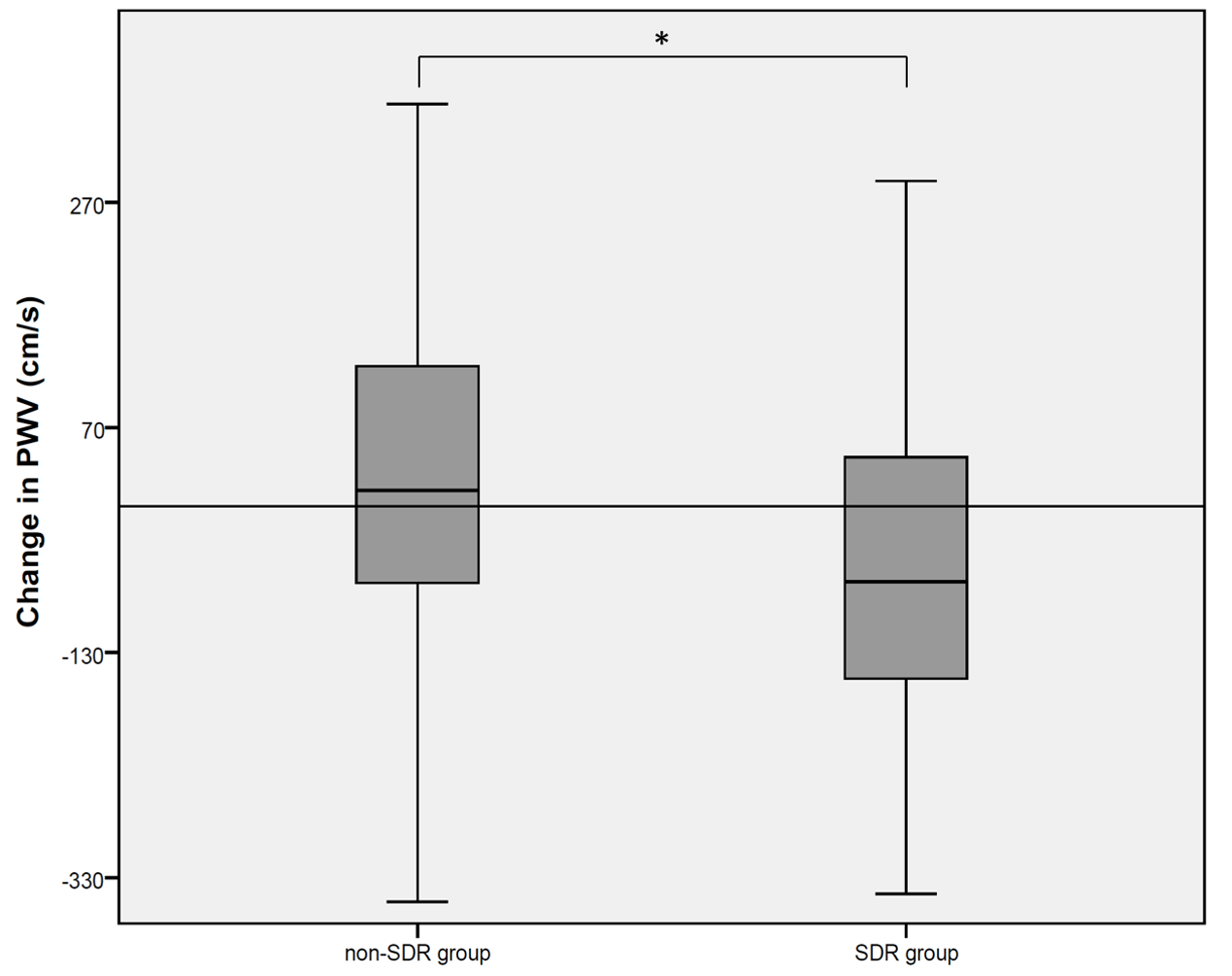Session Information
Date: Monday, November 6, 2017
Title: Rheumatoid Arthritis – Clinical Aspects III: Obesity and Other Comorbidities
Session Type: ACR Concurrent Abstract Session
Session Time: 4:30PM-6:00PM
Background/Purpose: Patients with rheumatoid arthritis (RA) have a higher incidence of cardiovascular disease (CVD) and prevalence of arterial stiffness (AS) due to chronic inflammation. AS in RA correlates not only with traditional CV risk factors, but also with current inflammation. Increased number and duration of flares over time and cumulative RA disease activity contribute to risk of CVD. While achieving Disease Activity Score in 28 joints (DAS) remission was associated with significant benefits in articular disease, its effect on co-morbidities such as CVD risk is uncertain. A more rigorous and sustained control of inflammation might be associated with a more favourable CV outcome in RA patients. The objective of this study was to investigate the effect of achieving sustained remission (DAS28 <2.6) on progression of arterial stiffness in early RA patients.
Methods: This is a post-hoc analysis of a prospective, randomized, controlled trial. 110 early RA patients received 1-year treatment based on a treat-to-target, tight-control protocol. Pulse wave velocity (PWV) and augmentation index (AIx) were measured at baseline and 12 months. Changes in AIx and PWV over 1-year was compared between patients who achieved sustained DAS remission (at 6, 9 and 12 months) (SDR group) and those who did not (non-SDR group).
Results: Sustained DAS remission was achieved in 37 (34%) patients. Baseline clinical characteristics and cardiovascular risk factors between the two groups were similar, except the symptom duration in the SDR group was significantly shorter. After 12 months, the change in PWV was significantly different between the two groups (SDR group: -67.0 [-153.0 to -43.5] cm/s vs non-SDR group: 14.0 [-68.0 to 14.5] cm/s, p=0.007). The change in AIx was similar between the two groups. Using multivariate regression analysis, independent predictors for PWV reduction included achieving sustained DAS remission (£]= -73, 95% CI: -150.1 to -9.1, p = 0.027) and a shorter symptom duration (£]= 6.3, 95% CI: 0.6 to 12.0, p = 0.032).
Conclusion: A significantly greater improvement in PWV was observed in patients who achieved sustained DAS remission compared to those who did not, indirectly supporting the notion that remission in RA confers diminished cardiovascular morbidity.
We would like to acknowledge the Health and Medical Research Fund (HMRF) for funding support (HMRF Project No.10110071)
Figure – Change in pulse wave velocity (PWV) between subject with sustained remission (SDR group) and without sustained remission (non-SDR group)
To cite this abstract in AMA style:
Tam LHP, SHANG Q, Li E, WONG P, Kwok KY, Kun EW, Yim IC, Lee VK, Yip RM, Pang SH, Lao VW, Mak Q, CHENG TH, Lau X, Li TK, ZHU TY, LEE PA, Tam LS. Can Achieving Sustained DAS Remission Prevent Arterial Stiffness Progression in Early Rheumatoid Arthritis – a Post-Hoc Analysis of a Randomized Controlled Study [abstract]. Arthritis Rheumatol. 2017; 69 (suppl 10). https://acrabstracts.org/abstract/can-achieving-sustained-das-remission-prevent-arterial-stiffness-progression-in-early-rheumatoid-arthritis-a-post-hoc-analysis-of-a-randomized-controlled-study/. Accessed .« Back to 2017 ACR/ARHP Annual Meeting
ACR Meeting Abstracts - https://acrabstracts.org/abstract/can-achieving-sustained-das-remission-prevent-arterial-stiffness-progression-in-early-rheumatoid-arthritis-a-post-hoc-analysis-of-a-randomized-controlled-study/

